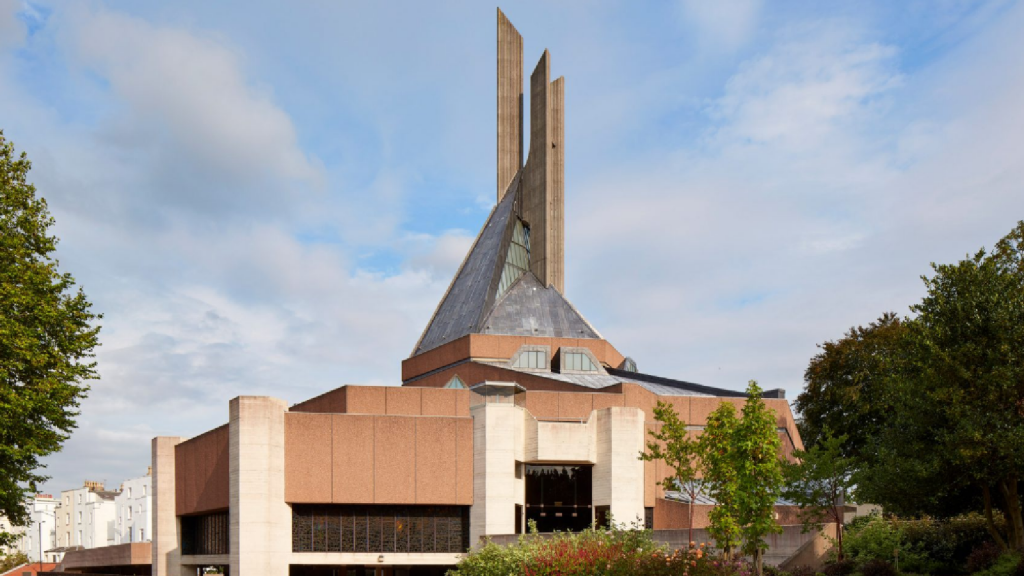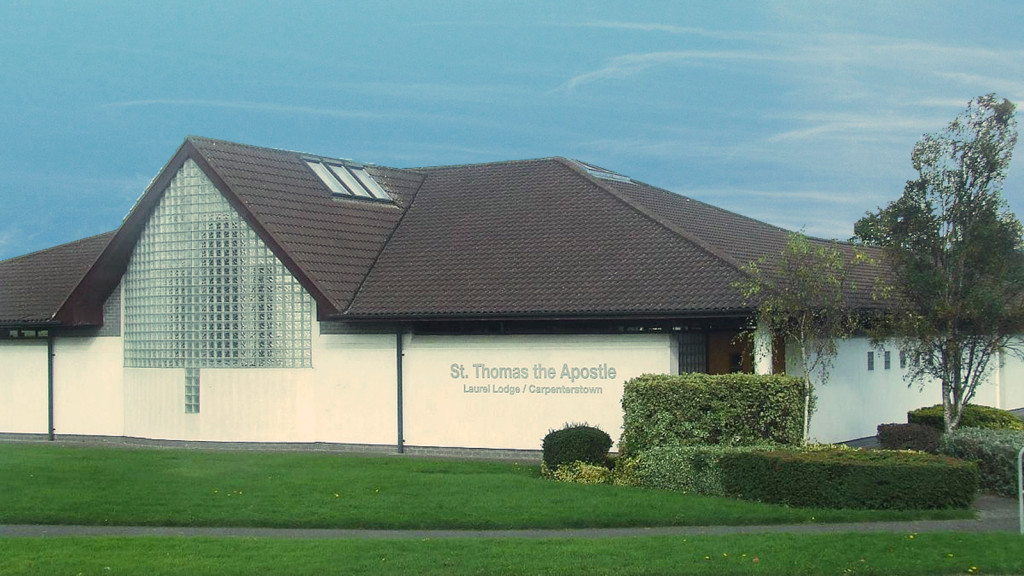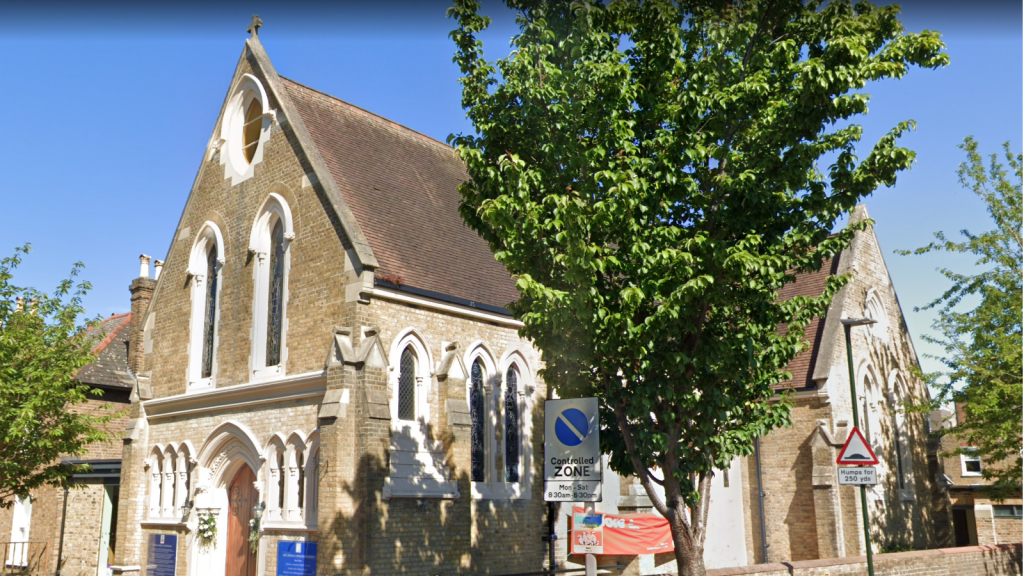Churches of the Day
Pictorial Thought for Today

Feb 5 - St Agatha (d. c. 250)
Patrick Duffy writes her story.
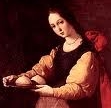 Agatha is one of seven female saints, along with Our Lady, who are mentioned in the the Roman Canon (Eucharistic Prayer 1). This indicates that quite early on historically she had a place of honour in the Roman Church. She is also depicted in the 6th century mosaics of Sant'Apollinare Nuovo in Ravenna.
Agatha is one of seven female saints, along with Our Lady, who are mentioned in the the Roman Canon (Eucharistic Prayer 1). This indicates that quite early on historically she had a place of honour in the Roman Church. She is also depicted in the 6th century mosaics of Sant'Apollinare Nuovo in Ravenna.(The image (above) is a detail from a painting by Francisco de Zurbarán (c. 1630) at the Musée Fabre, Montpellier, France.)
Example of Christian Virginity
St Agatha is one of the best-loved saints in Christian devotion despite the fact that very little is known of her life. Both Palermo and Catania in Sicily claim to have been her birth place. She stands for a long tradition in Christian devotion of female virginity, not as an imposition, but as a self-empowering act against a dominant culture. In the sixth century the Christian poet and bishop of Poitiers, St Venantius Fortunatus (535-605), mentions her in his poem on virginity as one of the celebrated Christian virgins and martyrs.
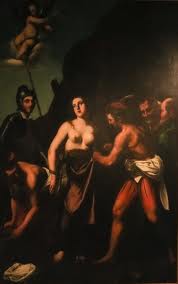 The Legend of her Martyrdom
The Legend of her MartyrdomThere are many versions of the legend of her martyrdom. One is that she was a girl of noble birth, who was sought after by a man of consular rank, named Quintian. He pursued her and when she refused him he had her handed over to a brothel-keeper named Aphrodisia, who tried to corrupt her, but without success. After undergoing various tortures, she is said to have had a vision of St Peter, who strengthened her. But eventually she died from her sufferings. She is said to have had her breasts cut off and is often represented in art carrying them on a dish (as in the image at the top of this article above left).
Patronage and Influence
This last circumstance has led to her being acclaimed as the patron saint of bell-founders and to the custom in some places of blessing small loaves of bread in church on her feast. She is invoked against fire, especially the eruptions of Mount Etna. Her intercession as patron of Malta is credited with preserving the island from the Turks in 1551.
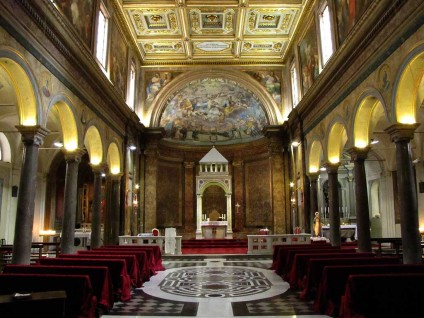
Church of Sant'Agata dei Goti in Rome
About the year 460 the influential Gothic soldier Ricimer built a church for the Goths in the Suburra area of central Rome (Via Mazzarino today) and we learn from Pope Gelasius it was called the Basilica of St Agatha. As the Goths were Arians, the building was reconsecrated as Catholic by Pope Gregory the Great (590-604). It was restored in the 16th and 17th century and the façade rebuilt by Francesco Ferrari in 1729.
The relief above the door shows St. Agatha holding her severed breast on a plate. From 1836 to 1926, it housed the Irish College. Sant'Agata dei Goti is also the name of a comune (town) near Naples.
******************************
Memorable Advice for today
The virtue of virginity is a source of courage,
strength, and independence, a superpower if you like.
It frees us to live fully, completely, and wholeheartedly for God.
~ Alison Sampson ~
**********************************
Wednesday of the Fourth Week of Ordinary Time, Cycle 1
Jesus himself will be rejected ,this foreshadows Israel's greater rejection and the turning to the Gentiles.
Memorial of St Agatha, third century martyr for the faith at Catonia, Sicily, in the 3rd Century, patron of bell-founders.
FIRST READING
A reading from the letter of to the Hebrews 12:4-7. 11-15
The Lord trains the ones that he loves.
 In the fight against sin, you have not yet had to keep fighting to the point of death. Have you forgotten that encouraging text in which you are addressed as sons? My son, when the Lord corrects you, do not treat it lightly; but do not get discouraged when he reprimands you. For the Lord trains the ones that he loves and he punishes all those that he acknowledges as his sons. Suffering is part of your training; God is treating you as his sons. Has there ever been any son whose father did not train him?
In the fight against sin, you have not yet had to keep fighting to the point of death. Have you forgotten that encouraging text in which you are addressed as sons? My son, when the Lord corrects you, do not treat it lightly; but do not get discouraged when he reprimands you. For the Lord trains the ones that he loves and he punishes all those that he acknowledges as his sons. Suffering is part of your training; God is treating you as his sons. Has there ever been any son whose father did not train him?Of course, any punishment is most painful at the time, and far from pleasant; but later, in those on whom it has been used, it bears fruit in peace and goodness. So hold up your limp arms and steady your trembling knees and smooth out the path you tread; then the injured limb will not be wrenched, it will grow strong again.
Always be wanting peace with all people, and the holiness without which no one can ever see the Lord. Be careful that no one is deprived of the grace of God and that no root of bitterness should begin to grow and make trouble; this can poison a whole community.
The Word of the Lord Thanks be to God
Responsorial Psalm Ps 102
Response The love of the Lord is everlasting upon those who hold him in fear.
1. My soul, give thanks to the Lord, all my being, bless his holy name.
My soul, give thanks to the Lord and never forget all his blessings. Response
2. As a father has compassion on his sons, the Lord has pity on those who fear him;
for he knows of what we are made, he remembers that we are dust. Response
3. But the love of the Lord is everlasting upon those who hold him in fear;
his justice reaches out to children's children when they keep his covenant in truth. Response
Gospel Acclamation Mt 4:4
Alleluia, alleluia!
Man does not live on bread alone
but on every word that comes from the mouth of God.
Alleluia!
Or Jn 10: 27
Alleluia, alleluia!
The sheep that belong to me listen to my voice, says the Lord.
I know them and they follow me.
Alleluia!
GOSPEL
The Lord be with you And with your spirit.
A reading from the holy Gospel according to Mark 6:1-6 Glory to you, O Lord
A prophet is only despised in his own country.

Jesus went to his home town and his disciples accompanied him. With the coming of the sabbath he began teaching in the synagogue and most of them were astonished when they heard him. They said,
'Where did the man get all this? What is this wisdom that has been granted him, and these miracles that are worked through him? This is the carpenter, surely, the son of Mary, the brother of James and Joset and Jude and Simon? His sisters, too, are they not here with us?'
And they would not accept him.
And Jesus said to them, 'A prophet is only despised in his own country, among his own relations and in his own house'; and he could work no miracle there, though he cured a few sick people by laying his hands on them.
The Gospel o the Lord Praise to you, Lord Jesus Christ.
********************
Gospel Reflection Wednesday Fourth Week in Ordinary Time Mark 6:1–6
In today’s first reading, the preacher of this written homily called ‘the letter to the Hebrews’ says to his listeners, ‘Be careful… that no root of bitterness should begin to grow and make trouble; this can poison a whole community’. The bitterness he warns against seems to have been there among the community present when Jesus was preaching in his home synagogue in Nazareth. According to Mark, when Jesus preached elsewhere in Galilee ‘they were all amazed, and they kept on asking one another, “What is this? A new teaching – with authority!”’. When he healed the paralytic, ‘they were all amazed and glorified God, saying, “We have never seen anything like this!”’. The reaction of the people of Jesus’ own Galilean village was very different. They recognized the wisdom of his teaching and the powerful deeds that were worked through him.
However, far from glorifying God, recognizing that God was the source of his wisdom and powerful deeds, they would not accept him. Jesus met with a wall of unbelief, with the result, according to Mark, ‘he could work no miracle there’. It was as if the resistance of the people of Nazareth disempowered him. The gospel reading suggests that it was the very familiarity of Jesus, one of their own, that prevented the people of Nazareth from appreciating who was standing among them. Sometimes familiarity does breed contempt. Our familiarity with the gospel message can breed, if not contempt, at least a certain indifference and ennui within us. We need to keep on recovering the freshness of this ever new teaching, so that we continue to stand in amazement at all Jesus says and does in the gospels, and, also, at the enduring power of his words and his presence among us today.
________________________________
The scripture readings are taken from The Jerusalem Bible, published by Darton, Longman and Todd Ltd and used with the permission of the publishers. http://dltbooks.com/
The Gospel reflection comes from Reflections on the Weekday Readings : You have the Words of Eternal life: by Martin Hogan and published by Messenger Publications c/f www.messenger.ie/bookshop/
________________
Sliocht as Litir Naomh Pól chuig na Eabhraig 12:4-7. 11-15
Óir is ar an duine a bhfuil grá aige air a chuireann Dia smacht.
 A bhráithre, ag troid in aghaidh an phaeca daoibh ní raibh oraibh seasamh go doirteadh fola fós.
A bhráithre, ag troid in aghaidh an phaeca daoibh ní raibh oraibh seasamh go doirteadh fola fós.Agus tá dearmad déanta agaibh ar na briathra spreagúla a labhraítear libh mar chlann mhac Dé: “A mhic liom, ná déan neamhní den smacht a chuireann Dia ort, ná bíodh lagmhisneach ort nuair a cheartaíonn sé thú. Óir is ar an duine a bhfuil grá aige air a chuireann Dia smacht agus sciúrsálann sé gach duine a nglacann sé leis mar mhac.” Bígí buanseasmhach, mar sin, ionas go ndéanfar sibh a oiliúint; is mar chlann mhac atá Dia ag caitheamh libh. Cá bhfuil an mac nach gcuireann a athair smacht air?
Nuair a chuirtear smacht orainn, ní ábhar áthais dúinn é ag an am ach ábhar dóláis. Ina dhiaidh sin, áfach, tugann an smacht an tsíocháin agus an fhíréantacht uaidh mar thoradh do na daoine a oileadh tríd. Dá bhrí sin, “teannaigí bhur lámha faona agus bhur nglúine laga agus déanaigí cosáin réidhe do bhur gcosa.” Ar an gcuma sin in ionad an chos leonta a chur as alt is amhlaidh a leigheasfar í.
Déanaigí iarracht ar an tsíocháin a bhuanú eadraibh féin agus gach uile dhuine; lorgaigí an naofacht sin nach bhfeicfidh aon duine an Tiarna gan í; féachaigí chuige nach gcaillfidh aon duine agaibh grásta Dé, agus nach bhfásfaidh aon fhréamh nimhneach suas in bhur measc a chuirfeadh buaireamh oraibh agus a thruailleodh an t-iomlán agaibh.
Briathar an Tiarna Buíochas le Dia
Salm le Freagra Sm 102
Freagra Maireann buanghrá an Tiarna go síoraí don dream ar a mbíonn a eagla
Malairt Freagra Alleluia
Beannaigh an Tiarna, a anam liom; go mbeannaí a bhfuil ionam a ainm naofa.
Beannaigh an Tiarna, a anam liom; ná tabhair i ndíchuimhne a thíolacthaí uile. Freagra
Amhail is trua leis an athair a chlann, is trua leis an Tiarna lucht a eaglaithe.
Óir is eol dó an tslí inar cumadh sinn agus is cuimhin leis nach bhfuil ionainn ach luaithreach. Freagra
Maireann buanghrá an Tiarna go síoraí don dream ar a mbíonn a eagla,
agus a fhíréantacht do chlann a gclainne nuair a chomhlíonann siad a chonradh go dílis. Freagra
SOISCÉAL
Go raibh an Tiarna libh. Agus le do spiorad féin
Sliocht as Soiscéal naofa de réir Naomh Marcas 6:1-6 Glóir duit a Thiarna.
Ní bhíonn fáidh faoi neamhchion ach amháin ina dhúiche féin

San am sin tháinig Íosa ina dhúiche féin, agus lean a chuid deisceabal é. Agus ar an tsabóid thosaigh sé ag teagasc sa tsionagóg, agus ghabh iontas mórán dár chuala é; agus deiridís:
“Cá bhfuair sé seo an méid sin? Agus cén eagna í seo a tugadh dó agus na míorúiltí móra seo a dhéantar trína lámha? Nach é seo an saor adhmaid, mac Mhuire agus bráthair Shéamais agus Iósaef agus Iúdáis agus Shíomóin? Agus nach bhfuil a shiúracha anseo inár measc?” Agus ghlac siad scannal ann.
Ach dúirt Íosa leo:
“Ní bhíonn fáidh faoi neamhchion ach amháin ina dhúiche féin agus i measc a ghaolta féin agus ina theaghlach féin.” Agus ní fhéadfadh sé míorúilt ar bith a dhéanamh ansiúd ach amháin a lámha a chur ar bheagán othar agus iad a leigheas, agus rinne sé ionadh dá ndíchreideamh.
Soiscéal an Tiarna. Moladh duit, a Chriost
AN BÍOBLA NAOFA
© An Sagart
Fifth Sunday in Ordinary Time Cycle C
Today we look at the vocations of Isaiah, Paul and Peter, all called in strange circumstances.
They each recognise their own unworthiness, but have the assurance that God will be with them.
Through our Baptism we also are called to build God's kingdom.
We should fear no evil for the Lord is with us.
FIRST READING
A reading from the book of the Prophet Isaiah 6:1-8
Here I am, send me.
In the year of King Uzziah's death I saw the Lord seated on a high throne;
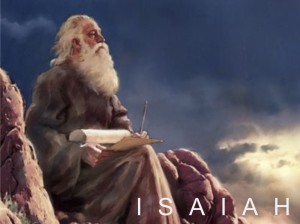
his train filled the sanctuary; above him stood seraphs, each one with six wings.
And they cried out one to another in this way,
'Holy, holy, holy is the Lord of hosts. His glory fills the whole earth.'
The foundations of the threshold shook with the voice of the one who cried out
and the Temple was filled with smoke. I said:
'What a wretched state I am in!
I am lost, for I am a man of unclean lips\
and I live among a people of unclean lips, and my eyes have looked at the King, the Lord of hosts.'
Then one of the seraphs flew to me, holding in his hand a live coal which he had taken from the altar with a pair of tongs. With this he touched my mouth and said:
'See now, this has touched your lips, your sin is taken away, your iniquity is purged.
Then I heard the voice of the Lord saying: 'Whom shall I send? Who will be our messenger?'
I answered, 'Here I am, send me.
The Word of the Lord Thanks be to God.
Responsorial Psalm Ps 137
Response Before the angels I will bless you, O Lord.
1. I thank you, Lord, with all my heart, you have heard the words of my mouth.
Before the angels I will bless you. I will adore before your holy temple. Response
2. I thank you for your faithfulness and love which excel all we ever knew of you.
On the day I called, you answered; you increased the strength of my soul. Response
3. All earth's kings shall thank you when they hear the words of your mouth.
They shall sing of the Lord's ways: 'How great is the glory of the Lord!' Response
4. You stretch out your hand and save me, your hand will do all things for me.
Your love, O Lord, is eternal, discard not the work of your hand. Response
SECOND READING
A reading from the first letter of St Paul to the Corinthians 15: 3-8. 11
I preach what they preach, and this is what you all believed.
Brothers, I want to remind you of the gospel I preached to you, the gospel that you received and in which you are firmly
 established because the gospel will save you only if you keep believing exactly what I preached to you
established because the gospel will save you only if you keep believing exactly what I preached to you- believing anything else will not lead to anything.
Well then, in the first place, I taught you what I had been taught myself, namely that Christ died for our sins, in accordance with the scriptures; that he was buried; and that he was raised to life on the third day, in accordance with the scriptures; that he appeared first to Cephas and secondly to the Twelve. Next he appeared to more than five hundred of the brothers at the same time, most of whom are still alive, though some have died; then he appeared to James, and then to all the apostles;
and last of all he appeared to me too; it was as though I was born when no one expected it.
But what matters is that I preach what they preach, and this is what you all believed.
The Word of the Lord Thanks be to God.
_______________________________
(Shorter Reading)
SECOND READING
A reading from the first letter of St Paul to the Corinthians 15: 3-8.
I preach what they preach, and this is what you all believed.
In the first place, I taught you what I had been taught myself, namely that Christ died for our sins, in accordance with the scriptures; that he was buried; and that he was raised to life on the third day, in accordance with the scriptures; that he appeared first to Cephas and secondly to the Twelve. Next he appeared to more than five hundred of the brothers at the same time, most of whom are still alive, though some have died; then he appeared to James, and then to all the apostles;
and last of all he appeared to me too; it was as though I was born when no one expected it.
But what matters is that I preach what they preach, and this is what you all believed.
The Word of the Lord Thanks be to God.
________________________________________
Gospel Acclamation Jn 15: 15
Alleluia, alleluia!
I call you friends, says the Lord,
because I have made known to you everything I have learnt from my Father.
Alleluia!
Or Mt 4:19
Alleluia, Alleluia!
Follow me, says the Lord, and I will make you fishers of men.
Alleluia!
GOSPEL
The Lord be with you. And with your spirit
A reading from the holy Gospel according to Luke 5: 1-11 Glory to you O Lord
They left everything and followed him.
Jesus was standing one day by the Lake of Gennesaret, with the crowd pressing round him listening to the word of God, when he caught sight of two boats close to the bank. The fishermen had gone out of them and were washing their nets. He got into one of the boats-it was Simon's-and asked him to put out a little from the shore. Then he sat down and taught the crowds from the boat.
When he had finished speaking he said to Simon,
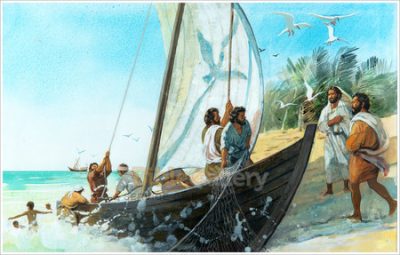
'Put out into deep water and pay out your nets for a catch'.
'Master,' Simon replied 'we worked hard all night long and caught nothing,
but if you say so, I will pay out the nets for a catch.'
And when they had done this they netted such a huge number of fish that their nets began to tear, so they signalled to their companions in the other boat to come and help them; when these came, they filled the two boats to sinking point.
When Simon Peter saw this he fell at the knees of Jesus saying,
'Leave me, Lord; I am a sinful man.' For he and all his companions were completely overcome by the catch they had made; so also were James and John, sons of Zebedee, who were Simon's partners.
But Jesus said to Simon,
'Do not be afraid; from now on it is men you will catch'.
Then, bringing their boats back to land, they left everything and followed him.
The Gospel of the Lord Praise to you, Lord Jesus Christ.
_________________
For homily resources for this Sunday's Gospel click here: https://www.catholicireland.net/sunday-homily/
Taken from THE JERUSALEM BIBLE, published and copyright 1966 by Darton, Longman and Todd Ltd and Doubleday, a division of Random House Inc, and used by permission of the publishers.
Sliocht as Leabhar Íseáia 6:1-8
Seo anseo mise, cuir mise!
 An bhliain a bhfuair an Rí Uiziá bás, chonaic mé an Tiarna ina shuí ar ríchathaoir ard agus an sanctóir líonta lena scuaine: bhí saraifíní os a chionn, sé cinn d’eiteoga ar gach aon acu; dhá cheann ag clúdach a ngnúise, dhá cheann lena gcosa a chlúdach, dhá cheann chun eitilte.
An bhliain a bhfuair an Rí Uiziá bás, chonaic mé an Tiarna ina shuí ar ríchathaoir ard agus an sanctóir líonta lena scuaine: bhí saraifíní os a chionn, sé cinn d’eiteoga ar gach aon acu; dhá cheann ag clúdach a ngnúise, dhá cheann lena gcosa a chlúdach, dhá cheann chun eitilte.Agus bhí siad ag scairteadh na bhfocal seo ar a chéile:
“Is naofa, naofa, naofa Tiarna na Slua. Tá an talamh lán dá ghlóir.”
Bhí bacáin na tairsí ar crith le glór an té a bhí ag scairteadh agus bhí an Teampall á líonadh le deatach. Arsa mise:
Is mairg dom, tá mé caillte, óir is duine mé a bhfuil a bheola neamhghlan,
tá cónaí orm i measc pobal a bhfuil a mbeola neamhghlan agus tá mo shúile tar éis amharc ar an Rí, Tiarna na Slua.
Thainig ceann de na saraifíní ar eitilt chugam, agus aibhleog ina láimh aige a thóg sé le tlú ón altóir. Chuimil sé le mo bhéal í agus dúirt:
“Seo, cuimleadh í seo le do bheola, tá do pheaca scriosta, tá d’urchóid clúdaithe.”
Ansin chuala mé glór an Tiarna, á rá: “Cé a chuirfidh mé uaim? Cé a labhróidh thar mo cheann?”
D’fhreagair mise: “Seo anseo mise, cuir mise!”
Briathar an Tiarna Buíochas le Dia.
Salm le Freagra Sm 137
Freagra I bhfianaise na n-aingeal móraim thú, a Thiarna.
I. Gabhaim buíochas leat, a Thiarna, ó mo chroí go hiomlán mar gur éist tú e briathra mo bhéil.
I bhfianaise na n-aingeal móraim thú; sléachtaim i dtreo do theampaill naofa. Freagra
2. Gabhaim buíochas leat as ucht do mhaitheasa is do dhílse, mar gur mó fós do gheallúint ná do chlú.
Nuair a ghlaoigh mé ort d'éist tú liom, agus thug tú neart breise do m'anam. Freagra
3. Molfaidh ríthe na cruinne go léir thú nuair a chluinfidh siad briathra do bhéil.
Canfaidh siad slite an Tiarna: 'Nach mór í glóir an Tiarna!' Freagra
4. Leathann tú do lámh in aghaidh fhearg mo naimhde; tarrthaíonn do dheaslámh mé.
A Thiarna, maireann do mhaitheas go síoraí; ná tréig obair do lámh. Freagra
DARA LÉACHT
Sliocht as céad Litir Naomh Pól chuig na Coirintig 15:3-8. 11
Sin mar a fhógraímid agus sin mar a chreid sibhse.
A bhráithre, ba mhaith liom a mheabhrú anois daoibh, a bhráithre, an dea-scéal úd a d’fhógair mé daoibh agus ar ghlac sibhse leis agus a bhfuil sibh suite go daingean de. Is ann chomh maith atá bhur slánú le fáil má chloíonn sibh go dlúth leis an teagasc mar a thug mise daoibh é – ach mura in aisce a chreid sibh.

Thug mé daoibh mar chéad nithe an teagasc a bhí faighte agam féin: go bhfuair Críost bás in éiric ár bpeacaí, de réir na scrioptúr; gur adhlacadh é agus gur éirigh sé an tríú lá de réir na scrioptúr; gur thaispeáin sé é féin do Chéafas agus ina dhiaidh sin don dáréag; gur thaispeáin sé é féin do bhreis agus cúig céad de na bráithre in éineacht a bhfuil a bhformhór ar marthain go fóill cé go bhfuil cuid acu ar shlí na fírinne.
Ansin thaispeáin sé é féin do Shéamas agus ina dhiaidh sin do na haspail go léir.
Agus i ndeireadh na dála thaispeáin sé é féin domsa faoi mar gur dhuine mé a rugadh in antráth.
Mar is mise an duine is lú ar fad de na haspail – ní fiú mé go dtabharfaí aspal orm de bhrí go ndearna mé géarleanúint ar eaglais Dé. Ach le grásta Dé táim mar atáim agus ní díomhaoin a bhí a ghrásta i mo leith. Níorbh ea go deimhin mar is déine a shaothraigh mé ná aspal ar bith acu, siúd is nach mise faoi deara é ach grásta Dé a bhí ag obair liom. Ach is cuma idir mise agus iadsan, sin mar a fhógraímid agus sin mar a chreid sibhse.
Briathar an Tiarna Buíochas le Dia.
____________________________________
Malairt Gearr
DARA LÉACHT
Sliocht as céad Litir Naomh Pól chuig na Coirintig 15:3-8. 11
Sin mar a fhógraímid agus sin mar a chreid sibhse.
Thug mé daoibh mar chéad nithe an teagasc a bhí faighte agam féin: go bhfuair Críost bás in éiric ár bpeacaí, de réir na scrioptúr; gur adhlacadh é agus gur éirigh sé an tríú lá de réir na scrioptúr; gur thaispeáin sé é féin do Chéafas agus ina dhiaidh sin don dáréag; gur thaispeáin sé é féin do bhreis agus cúig céad de na bráithre in éineacht a bhfuil a bhformhór ar marthain go fóill cé go bhfuil cuid acu ar shlí na fírinne.
Ansin thaispeáin sé é féin do Shéamas agus ina dhiaidh sin do na haspail go léir. Agus i ndeireadh na dála thaispeáin sé é féin domsa faoi mar gur dhuine mé a rugadh in antráth.
Mar is mise an duine is lú ar fad de na haspail – ní fiú mé go dtabharfaí aspal orm de bhrí go ndearna mé géarleanúint ar eaglais Dé. Ach le grásta Dé táim mar atáim agus ní díomhaoin a bhí a ghrásta i mo leith. Níorbh ea go deimhin mar is déine a shaothraigh mé ná aspal ar bith acu, siúd is nach mise faoi deara é ach grásta Dé a bhí ag obair liom. Ach is cuma idir mise agus iadsan, sin mar a fhógraímid agus sin mar a chreid sibhse.
Briathar an Tiarna Buíochas le Dia
______________________________
Alleluia Véarsa Eo 6: 63, 68
Alleluia, alleluia!
Is spiorad agus is beatha iad d'focail. Is agatsa atá briathra na beatha síoraí.
Alleluia!
SOISCÉAL
Go raibh an Tiarna libh. Agus le do spiorad féin
Sliocht as Soiscéal naofa de réir Naomh Lúcás 5:1-11 Glóir duit, a Thiarna.
d’Fhág siad gach uile ní agus lean é.
Aon lá amháin, agus an slua ag brú isteach air ag éisteacht le briathar Dé, bhí sé ina sheasamh ar bhruach loch Gheinéasaireit, agus chonaic sé dhá bhád ina luí ar chladach an locha; bhí na hiascairí tar éis teacht amach astu agus iad ag ní na líonta. Chuaigh sé isteach i mbád acu, bád Shíomóin, agus d’iarr air tarraingt amach beagán ón talamh: ansin shuigh, agus thosaigh ag teagasc na sluaite as an mbád.
Nuair a stad sé den chaint, dúirt sé le Síomón:
“Tarraing amach san uisce domhain agus cuirigí amach bhur líonta ag iascach.”

D’fhreagair Síomón agus dúirt:
“A Mháistir, thugamar an oíche go léir ag saothrú agus níor thógamar aon ní; ach i ngeall ar d’fhocalsa, cuirfidh mé amach na líonta.”
Nuair a rinne siad é sin, cheap siad clais mhór éisc. Bhí a gcuid líonta ag briseadh, agus sméid siad ar a gcomrádaithe sa bhád eile teacht i gcabhair orthu. Tháinig siad agus líon an dá bhád nó go raibh siad ar tí dul faoi.
Nuair a chonaic Síomón Peadar é sin, chaith sé é féin ag glúine Íosa ag rá:
“Imigh uaim, a Thiarna, mar is peacach mé.” Óir ghabh alltacht é féin agus a chompánaigh uile faoin ngabháil éisc a thóg siad agus mar an gcéanna do Shéamas agus d’Eoin, clann Zeibidé, a bhí i bpáirt le Síomón.
Agus dúirt Íosa le Síomón:
“Ná bíodh eagla ort, as seo amach is daoine a bheidh tú a ghabháil.”
Agus tharraing siad na báid aníos ar an trá, d’fhág siad gach uile ní agus lean é.
Soiscéal an Tiarna. Moladh duit, a Chriost
AN BÍOBLA NAOFA
© An Sagart


